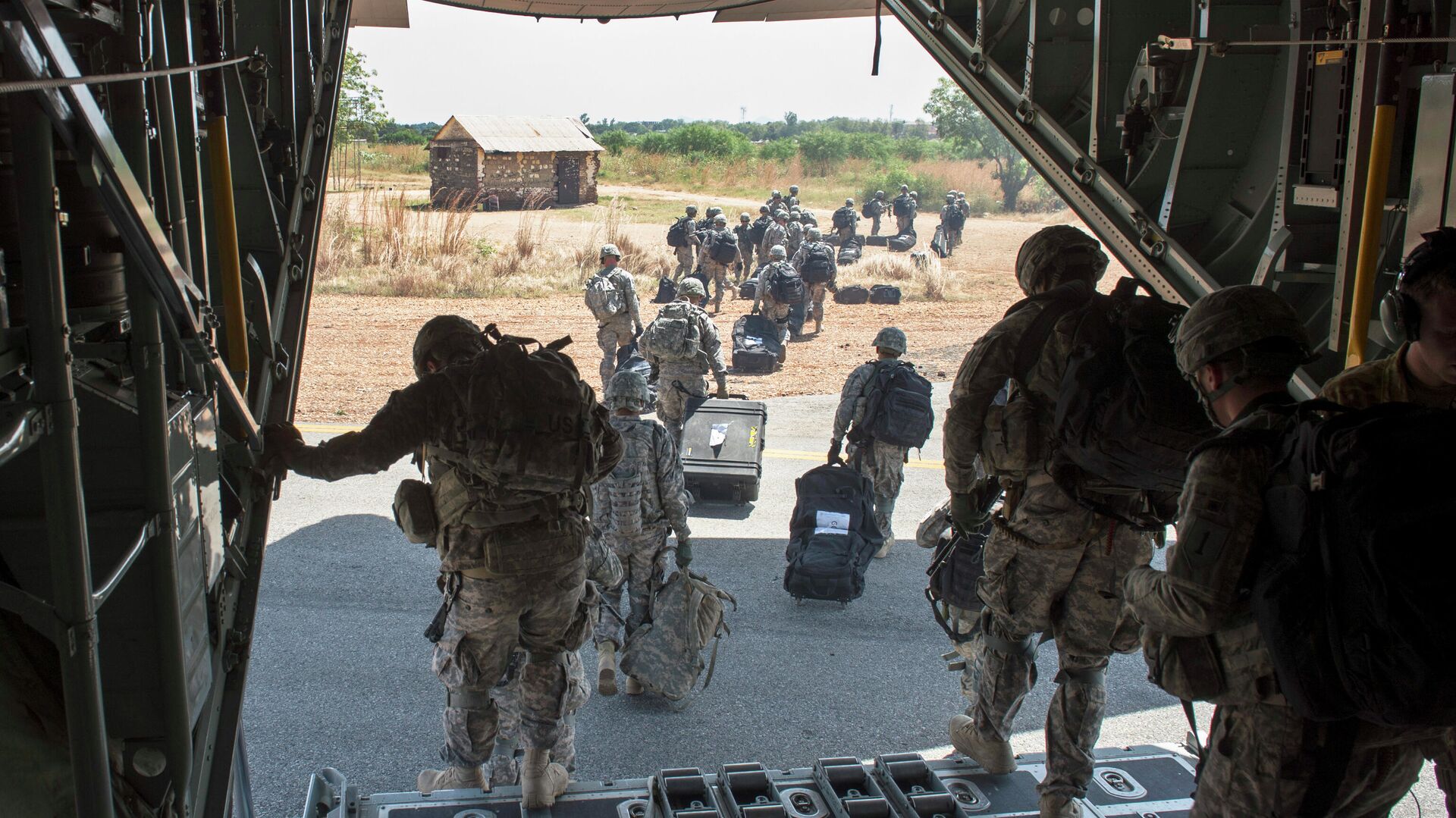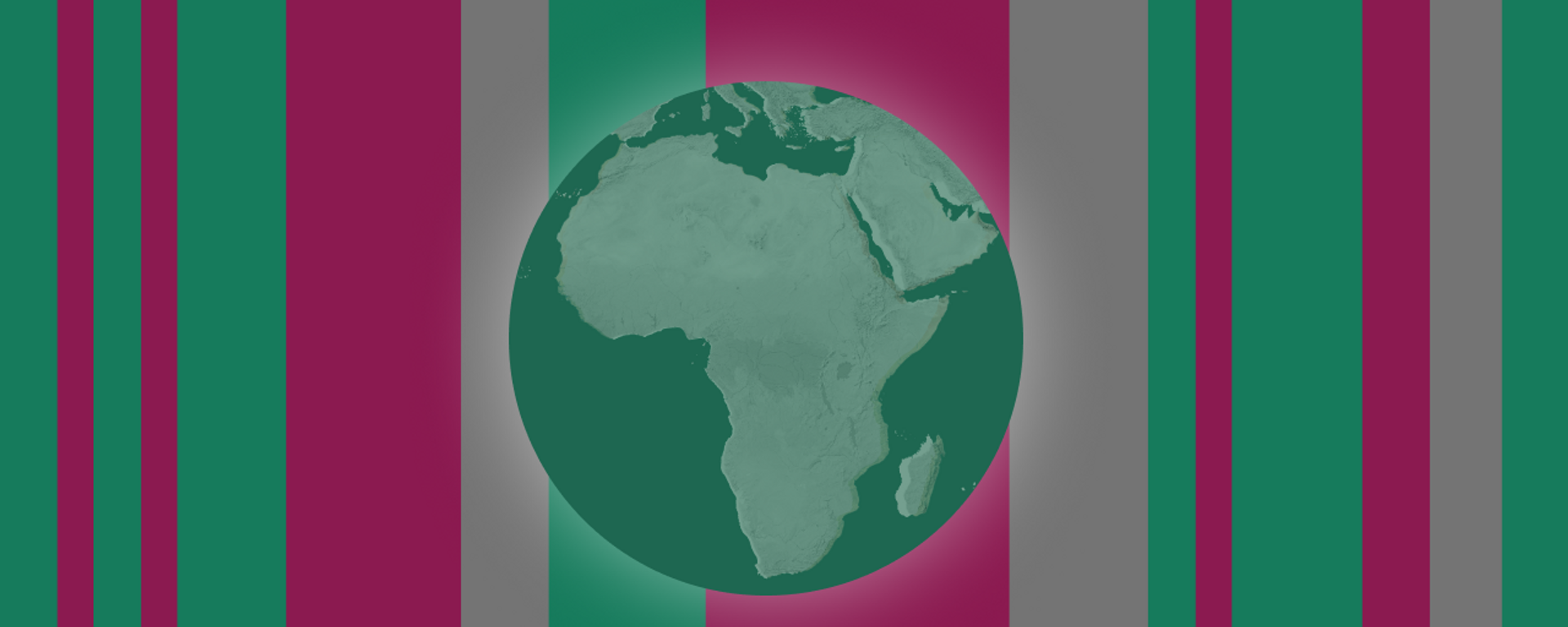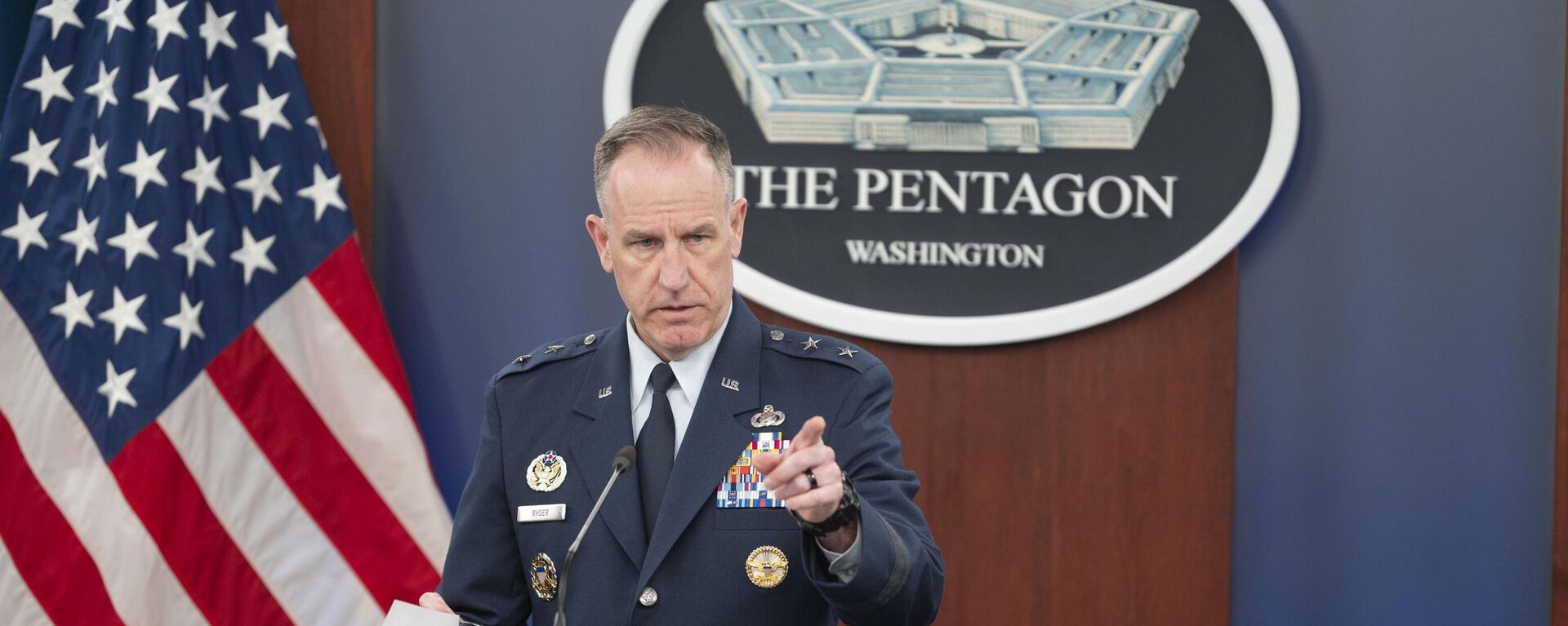https://en.sputniknews.africa/20240428/1066274930.html
Pullout of US Troops From Chad, Niger Signals Collapse of American Hegemony: Retired CIA Officer
Pullout of US Troops From Chad, Niger Signals Collapse of American Hegemony: Retired CIA Officer
Sputnik Africa
US Special Operations forces will temporarily withdraw from Chad in the coming days in response to the Sahel nation's questioning of the legality of the US... 28.04.2024, Sputnik Africa
2024-04-28T15:17+0200
2024-04-28T15:17+0200
2024-04-28T15:17+0200
sub-saharan africa
boris johnson
united states (us)
chad
russia
cia
pentagon (us department of defense)
niger
troops
military base
https://cdn1.img.sputniknews.africa/img/07e7/04/15/1058742486_0:159:3076:1889_1920x0_80_0_0_7035cf12d7540ea5ddfbaf693c5173ab.jpg
Dozens of 75 Army Special Forces troops stationed in Ndjamena, Chad's capital, are being withdrawn ahead of the Sahel nation's presidential election scheduled for May 6.In April, Chad's leadership sent a letter to the U.S. defense attaché informing him that Ndjamena was terminating the Status of Forces Agreement (SOFA) with Washington. The exact number of US troops in the African nation is unclear, but US officials insist it doesn't exceed 100 soldiers.According to the US press, the Pentagon still hopes to negotiate a new agreement with the Chadian government and return to the country after the elections. But CIA veteran Larry Johnson believes the US military will leave the country for good."They've had some [military] bases in both of those countries that were designed to go find al-Qaeda operatives and try to destroy them. But, clearly the conduct of US policy in this regard is being rejected by the local governments. So it is really a black eye for these United States in terms of its overall loss of influence. And I think it’s going to be replaced by Russia," he continued.Chad was under French colonial rule from 1900 to 1960. After the Sahelian nation gained independence, the French continued to send troops to the region on several occasions in the 1960s, 1970s, and 1980s under the pretext of protecting Chad's governments.Between 1986 and 2014, French forces maintained a permanent presence in the African country as part of Operation Epervier (Operation Sparrowhawk), which was launched with the stated goal of protecting Chad from Libyan forces and insurgents. After 2014, Operation Epervier was replaced by Operation Barkhane - Paris's massive counterterrorism effort in the Sahel, which was later denounced as a failure by most governments in the region.In May 2014, the Washington Post reported that the US sent just 80 troops to Chad to support the operation of intelligence, surveillance, and reconnaissance aircraft for missions in northern Nigeria to find kidnapped Nigerian girls. The White House said the unit would remain in Chad "until its assistance in resolving the kidnapping is no longer needed."However, a TomDispatch investigation in 2014 found that the US had quietly increased its presence in Chad and elsewhere in Africa after NATO bombed Libya back to the Stone Age and destabilized nearby regions, where Islamist and insurgent violence surged.Following the failure of Operation Barkhane to defeat terrorists in the Sahel, Mali, Niger, and Burkina Faso successively called for the withdrawal of French troops. Between February 2022 and March 2023, French troops left the three African states, with about 1,000 French soldiers being relocated to Chad, where they remain today.However, the Washington Post believes that Chad's leader, General Mahamat Idriss Deby Itno, who has ruled since 2021, may soon call for the removal of French troops after the US military withdrawal. The newspaper noted that Chad, along with Mali, Niger and Burkina Faso, is turning to Russia to solve its economic and security problems.Chad has been strengthening its ties with Russia for some time. In January, Mahamat Idriss Deby Itno paid an official visit to Russia, while the Chadian foreign minister attended the Russia-Africa summit in St. Petersburg in July."This is part of this broader, let's call it disassembly of the US-led 'rules-based' international order. The United States effort to dominate the world has been reversed. It had reached a zenith, and it's now heading back downhill. So I think this is just one more sign that the US policy has gone astray," the CIA veteran concluded.
https://en.sputniknews.africa/20240427/infographics-united-states-losing-approval-in-africa-data-from-american-polling-agency-shows-1066264492.html
https://en.sputniknews.africa/20240426/us-to-reposition-some-troops-from-chad-as-part-of-cooperation-review---pentagon-1066244412.html
united states (us)
chad
russia
niger
Sputnik Africa
feedback@sputniknews.com
+74956456601
MIA „Rossiya Segodnya“
2024
News
en_EN
Sputnik Africa
feedback@sputniknews.com
+74956456601
MIA „Rossiya Segodnya“
Sputnik Africa
feedback@sputniknews.com
+74956456601
MIA „Rossiya Segodnya“
boris johnson, united states (us), chad, russia, cia, pentagon (us department of defense), niger, troops, military base, military cooperation, cooperation
boris johnson, united states (us), chad, russia, cia, pentagon (us department of defense), niger, troops, military base, military cooperation, cooperation
Pullout of US Troops From Chad, Niger Signals Collapse of American Hegemony: Retired CIA Officer
US Special Operations forces will temporarily withdraw from Chad in the coming days in response to the Sahel nation's questioning of the legality of the US military presence in the region. The move comes after US troops were forced out of Niger.
Dozens of 75 Army Special Forces troops stationed in Ndjamena, Chad's capital, are being withdrawn ahead of the Sahel nation's presidential election scheduled for May 6.
In April, Chad's leadership sent a letter to the U.S. defense attaché informing him that Ndjamena was terminating the Status of Forces Agreement (SOFA) with Washington. The exact number of US troops in the African nation is unclear, but US officials insist it doesn't exceed 100 soldiers.
According to the US press, the Pentagon still hopes to negotiate a new agreement with the Chadian government and return to the country after the elections. But CIA veteran Larry Johnson believes the US military
will leave the country for good.
"It's failing. It's the easiest way to put it," Larry Johnson, a retired CIA intelligence officer and State Department official, told Sputnik, commenting on the US withdrawal from Niger and Chad.
"They've had some [military] bases in both of those countries that were designed to go find al-Qaeda operatives and try to destroy them. But, clearly the conduct of US policy in this regard is being rejected by the local governments. So it is really a black eye for these United States in terms of its overall
loss of influence. And I think it’s going to be replaced by Russia," he continued.
Chad was under French colonial rule from 1900 to 1960. After the Sahelian nation gained independence, the French continued to send troops to the region on several occasions in the 1960s, 1970s, and 1980s under the pretext of protecting Chad's governments.
Between 1986 and 2014, French forces maintained a
permanent presence in the African country as part of Operation Epervier (Operation Sparrowhawk), which was launched with the stated goal of protecting Chad from Libyan forces and insurgents. After 2014, Operation Epervier was replaced by Operation Barkhane - Paris's massive counterterrorism effort in the Sahel, which was later denounced as a failure by most governments in the region.
In May 2014, the Washington Post reported that the US sent just 80 troops to Chad to support the operation of intelligence, surveillance, and reconnaissance aircraft for missions in northern Nigeria to find kidnapped Nigerian girls. The White House said the unit would remain in Chad "until its assistance in resolving the kidnapping is no longer needed."
However, a TomDispatch investigation in 2014
found that the US had quietly increased its presence in Chad and elsewhere in Africa after NATO bombed Libya back to the Stone Age and destabilized nearby regions, where Islamist and insurgent violence surged.
Following the failure of Operation Barkhane to defeat terrorists in the Sahel, Mali, Niger, and Burkina Faso successively called for the withdrawal of French troops. Between February 2022 and March 2023, French troops
left the three African states, with about 1,000 French soldiers being relocated to Chad, where they remain today.
However, the Washington Post believes that Chad's leader, General Mahamat Idriss Deby Itno, who has ruled since 2021, may soon call for the removal of French troops after the US military withdrawal. The newspaper noted that Chad, along with Mali, Niger and Burkina Faso, is turning to Russia to solve its economic and security problems.
Chad has been strengthening its ties with Russia for some time. In January, Mahamat Idriss Deby Itno paid an official visit to Russia, while the Chadian foreign minister attended the Russia-Africa summit in St. Petersburg in July.
"Russia doesn't have a history of enslaving black Africans - number one," Johnson explained. "Russia is not closely tied to the colonial empires: The French, the Brits, the Germans, the Dutch, the Belgians, - who have a long history of exploiting Africa and exploiting the people, exploiting the resources. So I think that, both, both Russia and China are viewed as more honest brokers, to be candid. Much more so than the United States," he added.
"This is part of this broader, let's call it disassembly of the US-led 'rules-based' international order. The United States effort to dominate the world has been reversed. It had reached a zenith, and it's now heading back downhill. So I think this is just one more sign that the US policy has gone astray," the CIA veteran concluded.



